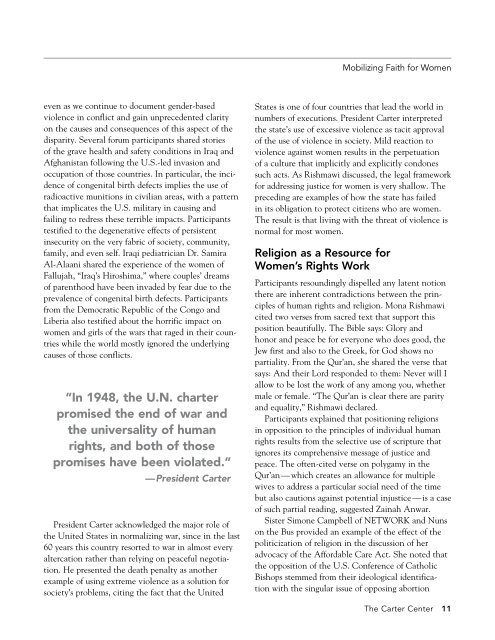v1E3z
v1E3z
v1E3z
You also want an ePaper? Increase the reach of your titles
YUMPU automatically turns print PDFs into web optimized ePapers that Google loves.
Mobilizing Faith for Womeneven as we continue to document gender-basedviolence in conflict and gain unprecedented clarityon the causes and consequences of this aspect of thedisparity. Several forum participants shared storiesof the grave health and safety conditions in Iraq andAfghanistan following the U.S.-led invasion andoccupation of those countries. In particular, the incidenceof congenital birth defects implies the use ofradioactive munitions in civilian areas, with a patternthat implicates the U.S. military in causing andfailing to redress these terrible impacts. Participantstestified to the degenerative effects of persistentinsecurity on the very fabric of society, community,family, and even self. Iraqi pediatrician Dr. SamiraAl-Alaani shared the experience of the women ofFallujah, “Iraq’s Hiroshima,” where couples’ dreamsof parenthood have been invaded by fear due to theprevalence of congenital birth defects. Participantsfrom the Democratic Republic of the Congo andLiberia also testified about the horrific impact onwomen and girls of the wars that raged in their countrieswhile the world mostly ignored the underlyingcauses of those conflicts.“In 1948, the U.N. charterpromised the end of war andthe universality of humanrights, and both of thosepromises have been violated.”— President CarterPresident Carter acknowledged the major role ofthe United States in normalizing war, since in the last60 years this country resorted to war in almost everyaltercation rather than relying on peaceful negotiation.He presented the death penalty as anotherexample of using extreme violence as a solution forsociety’s problems, citing the fact that the UnitedStates is one of four countries that lead the world innumbers of executions. President Carter interpretedthe state’s use of excessive violence as tacit approvalof the use of violence in society. Mild reaction toviolence against women results in the perpetuationof a culture that implicitly and explicitly condonessuch acts. As Rishmawi discussed, the legal frameworkfor addressing justice for women is very shallow. Thepreceding are examples of how the state has failedin its obligation to protect citizens who are women.The result is that living with the threat of violence isnormal for most women.Religion as a Resource forWomen’s Rights WorkParticipants resoundingly dispelled any latent notionthere are inherent contradictions between the principlesof human rights and religion. Mona Rishmawicited two verses from sacred text that support thisposition beautifully. The Bible says: Glory andhonor and peace be for everyone who does good, theJew first and also to the Greek, for God shows nopartiality. From the Qur’an, she shared the verse thatsays: And their Lord responded to them: Never will Iallow to be lost the work of any among you, whethermale or female. “The Qur’an is clear there are parityand equality,” Rishmawi declared.Participants explained that positioning religionsin opposition to the principles of individual humanrights results from the selective use of scripture thatignores its comprehensive message of justice andpeace. The often-cited verse on polygamy in theQur’an — which creates an allowance for multiplewives to address a particular social need of the timebut also cautions against potential injustice — is a caseof such partial reading, suggested Zainah Anwar.Sister Simone Campbell of NETWORK and Nunson the Bus provided an example of the effect of thepoliticization of religion in the discussion of heradvocacy of the Affordable Care Act. She noted thatthe opposition of the U.S. Conference of CatholicBishops stemmed from their ideological identificationwith the singular issue of opposing abortionThe Carter Center 11


